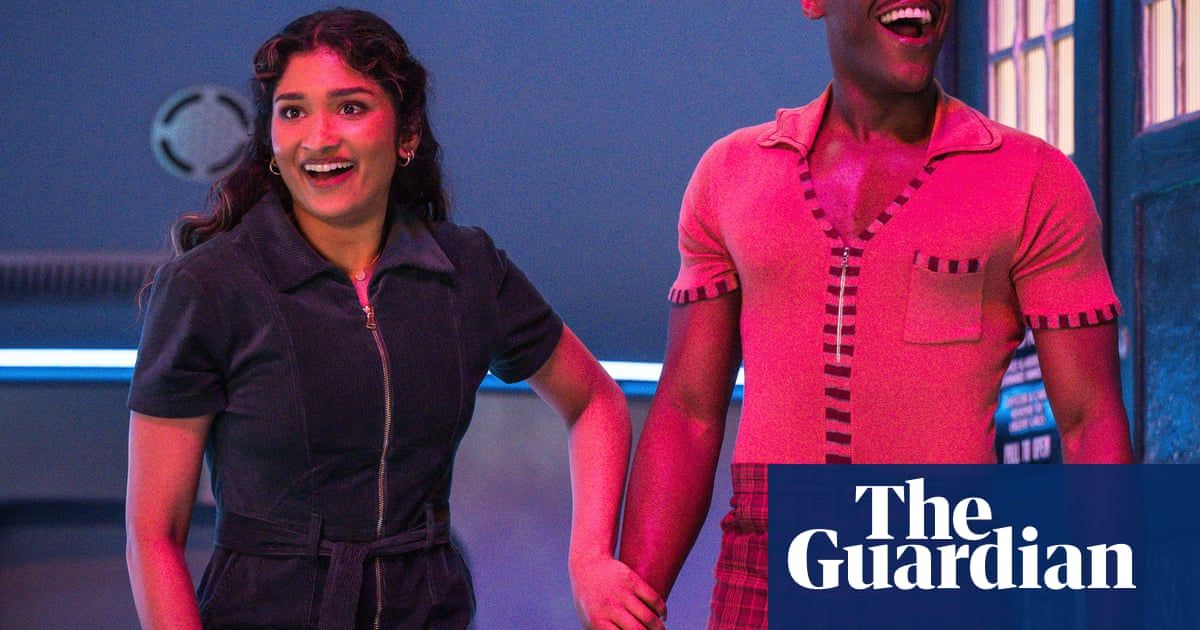For an episode that started out like a joyfully camp romp into the world of Eurovision, Juno Dawson turned in a script that truly had ice in its heart, in just the way the Doctor (Ncuti Gatwa) told Kid (Freddie Fox) that the Time Lord now had ice in his hearts.
Doctor Who stories often feature alien invasions, conquest, destruction and the desire for revenge, but they have seldom so bleakly painted the determination to carry out a mass casualty terrorism event. That in turn provoked one of the most extreme reactions we have ever seen from the lead character.
It was all quite an abrupt turn tonally, in an episode that felt fun but thin for the opening act. It had a larger ensemble cast to play with than some other stories this season, although it was fortunate that, separated, both the Doctor and Belinda (Varada Sethu) found themselves trapped with somebody who turned out to have technical expertise working bits of the space station.
The episode tackled several big themes at once – the rapacious capitalist exploitation of a planet to harvest a product, widely held dismissive and racist attitudes to an entire species, the pain of Miriam-Teak Lee’s character having to endure mutilation in order to fit in and participate in society, and the Doctor’s judgment that none of these things in turn could justify the actions of someone with a “cold filthy heart” that just likes to kill.
Before all that was the colour rush of watching the contest unfold. Your mileage may have varied here depending on how big a fan ofEurovisionyou are. Who could have guessed that Rylan would have more than a brief cameo? His self-deprecating persona was perfect for the part Dawson wrote for him, allowing him to roll with the jokes about his teeth and his career.
But perhaps the hardest thing to make believable was that any of the alien interstellar contestants and their songs from the future were as outlandish as some of the creations we have seen over the years on Earth at the real event.
What if Doctor Who did Eurovision in space, but in the middle of a terrorist attack?
Last season’s interactions between Ruby Sunday (Millie Gibson) and the Doctor relied on the audience taking at face value that they had become best buddies off-screen. The relationship between Belinda and the Doctor has been much more convincing. She looked genuinely taken aback when she witnessed the Doctor going into rage mode for the first time, and he was only ultimately held back when he saw his actions reflected in her expression.
And then there was Carole Ann Ford, who played William Hartnell’s first Doctor’s granddaughter in 1963 in the show’s very first episode, seemingly on board the 15th Doctor’s Tardis. Last season had teased a return for her, only to bait-and-switch the viewer that it wasSUtekh notSUsan all the clues had been pointing to. But there Susan was. What can it all mean?
The faceless robot guards were a classic Doctor Who background trope, extras deployed to deliver a bit of firepower but no real thrill. It was the Doctor who was by far the most frightening thing here. Gatwa has clearly had swagger, style and charisma to carry off the lighter side of his character, but here for the first time he was really able to flex being the oncoming storm, the Time Lord Victorious, the one thing you never put in a trap. In both his conversation with Kid over the video link, and the subsequent extended torture scene, Gatwa passed this Doctorly character test with flying colours.
Is it reading too much into the fact that last week out of the blue we saw Poppy, the captain from Space Babies, and this week the product driving the narrative was Poppy Honey? Probably. And there was dear old Mrs Flood, actively surveilling our heroes and clearly readying to put her dastardly bigeneration plan into action.
Ford’s appearance won’t have taken William Russell’s world record for longest gap between appearances as the same character in the same show. She reprised her role as Susan in 1983’s The Five Doctors. Russell set the record when he appeared inThe Power of the Doctorin 2022, 57 years after his character, Ian Chesterton’s initial departure.
The Rani, originally played by Kate O’Mara, first appeared as a renegade Time Lord in 1985’sThe Mark of the Rani.
When Archie Panjabi said she was the definite article, she was echoing Tom Baker’s words in his 1974 debut story, Robot, where, newly-regenerated, he told Harry Sullivan “You may be a doctor, but I’mtheDoctor. The definite article, you might say.”
In 2002, Sylvester McCoy’s Doctor and Bonnie Langford’s Mel visited the Intergalactic Song Contest in an expanded media audio adventure calledBang-Bang-a-Boom!
Graham Norton got to deliver the news of Earth’s destruction in hologram format. He has previously made not one but two unscheduled Doctor Who appearances. First, a BBC One sound erroradded a cheering crowd and his hot mic voiceto the tense opening ofRosein 2005. Second, an overlaid cartoon promo of him generated 5,000 complaints for ruining the cliffhanger ofThe Time of Angelsin 2010.He got exterminated for it.
Wish World is already upon us, part one of the season finale. See you then!
